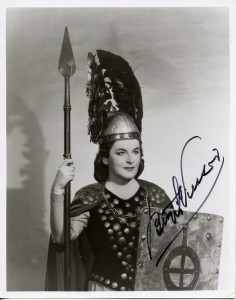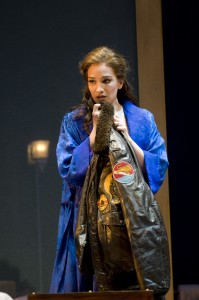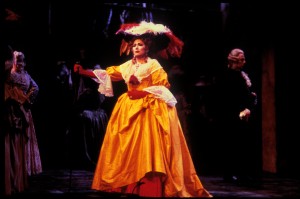 As recently as 1986, when I had been General Director of Seattle Opera for three years, a soprano brought her costume with her and planned to do “her” interpretation of the role. Of course in the performances she used our costume and performed the director’s vision of her part, but the idea of a star using one’s own costume—and doing one’s own thing dramatically–characterized many opera performances in much of the twentieth century. It may sound incredulous, but it came back to me when I have recently been asked as I complete my tenure as General Director of Seattle Opera how opera has changed since I took over the company in 1983.
As recently as 1986, when I had been General Director of Seattle Opera for three years, a soprano brought her costume with her and planned to do “her” interpretation of the role. Of course in the performances she used our costume and performed the director’s vision of her part, but the idea of a star using one’s own costume—and doing one’s own thing dramatically–characterized many opera performances in much of the twentieth century. It may sound incredulous, but it came back to me when I have recently been asked as I complete my tenure as General Director of Seattle Opera how opera has changed since I took over the company in 1983.
Prior to 1980 opera in the United States was characterized by stars: Marcella Sembrich and Jean de Reszke in the 1890s, Enrico Caruso and Geraldine Farrar in the first two decades of the twentieth century, Kirsten Flagstad and Lauritz Melchior in the thirties, and in my own experience such amazing singers as Maria Callas, Leontyne Price, Birgit Nilsson, Leonie Rysanek, Franco Corelli, and Cesare Siepi, to name just a few of the opera stars of the 50s and 60s. Renata Scotto, Placido Domingo and Luciano Pavarotti certainly kept this tradition going. Two characteristics of all of those named was their capacity to sell out a large auditorium, such as the Metropolitan Opera, and lots and lots of recordings.
Rudolf Bing introduced theater directors, such as Margaret Webster and Alfred Lunt, into his productions from 1950 on, but the real changes came from Europe. Wieland Wagner and Luchino Visconti brought a kind of involving and intense drama to opera during the 50s in their different countries in different ways, both becoming in many ways as noticed as the artists they were directing, and they laid the ground work for the power of Patrice Chereau’s Bayreuth Ring and the astonishing work of Ruth Berghaus among many others. From then until now the director, particularly in Europe, has become in many cases the most important part of many productions. The United States was not completely left out. John Dexter at the Metropolitan Opera created some brilliant productions, and at Seattle Opera Francois Rochaix and designer Robert Israel created a Ring in 1986 that was very influenced by Chereau and Bertolt Brecht. At first our Ring evoked a storm of boos—but just about as many cheers. Within ten years it had become popular and accepted.
Director’s opera (or Regieopera) in Europe occurred sporadically in the United States, principally in Pamela Rosenberg’s tenure as General Director of San Francisco Opera at the beginning of this century, until recently when the Metropolitan under the leadership of Peter Gelb brought many European directors and their ideas to New York and through the HD performances to the whole world. That many audience members resisted (and still resist) the new approach only slowed but never stopped its inevitable progress.
The other interlocking and even more important factor in changing opera came about in 1983 when Lotfi Mansouri, General Director of the Canadian Opera, invented titles. Hearing about it made me think it was a fad; about two minutes in the first titled performance I attended—Lohengrin in Toronto—I realized that I was seeing the future and became a strong advocate. Titles stopped forever the tiresome canard—“I don’t care what they sing about in opera; I only go to hear the voices.” I had heard that since I started going to opera in the 1940s, but when an audience suddenly found out the meaning of the sung words as they heard the music, the libretti, even weak ones, made sense.
Good titles were never literal translations, but they made the public aware of the words sung as they heard the music. In a few years almost every opera house in the world used titles, the Wagner Festival in Bayreuth as an exception. In my opinion this mechanical invention restored the basis of opera as articulated by the Camerata and realized by Monteverdi, particularly in The Coronation of Poppaea. Opera was suddenly theater with great music. I think it is especially interesting that titles became so popular in countries, such as Germany, where many operas have libretti in the vernacular. Any opera lover knows that a singer’s words, no matter how brilliantly articulated, can be hard to understand in certain areas of the voice or over a loud orchestra. A perfect example of the difference titles made came from a tenor friend of mine who had sung many Toscas. After an Act I shortly after titles were first used, he said to me, “I almost stopped singing. The audience laughed so much I thought something was wrong until I realized that they understood the humor of what we were singing.”
Titles and the prominence of the director have changed both singers and audiences. The audience concentration on one major singer, a hallmark of opera from at least Caruso’s day, had not really changed over most of the twentieth century. Companies that sprang up across America tended to pay for one star and fill the cast with less than equal performers because the audience cared mostly about the star. What we have now are singers who are involved in the theater of opera, who respond to their directors (as well as their conductors), and opera becomes much more of a theater piece than it ever was before.
Part of what happened in the recent past was the expectation that a famous artist would do what opera afficionados expected them to do in any familiar part or indeed whenever they were onstage. Personalities were more important than dramatic verity. Birgit Nilsson once told me that she was so bored by directors who asked her to “her Isolde.” “Sure, I can do that,” she said, “But I want to be stimulated to think in a different way about all the roles I do.” Leonie Rysanek said much the same thing to me even more violently. Audiences came to see and hear Scotto’s Butterfly or Tebaldi’s Mimi. Today in general audiences come to see and hear Madama Butterfly or La bohème. All singers are part of a production. This makes for better theater while it does not encourage them to come up with individual idiosyncrasies that often characterized some singers of the recent past. I am not arguing that this is the only reason that opera singers have changed, but it is certainly one factor.
I know singers over the last thirty years who would have been able to carry a show by themselves if they had lived a quarter century earlier, but the public, certainly in Europe, and also now in America has changed. They come to experience Tosca, which they now understand, as a work of theater with great singing. It’s a much more complete experience. It also has been responsible for certain operas such as the four operas of Wagner’s Ring to achieve unheard of popularity in non-German speaking countries. Wagner’s text is involving. Audiences now—and I know this from a great many Walküre performances—hang on to Wotan’s narration in Act II of Die Walküre and never think of it as boring. The Wotan has to feel the words and express them meaningfully, but if he does his part, the audience is fascinated. The old story that the great Metropolitan Opera board president, Otto Kahn, who loved Wagner, always left his box to have a drink when King Marke began his lament simply doesn’t happen.
Maybe the verbal and occasional fights that happened in the Met’s family circle and standing room lines during the 50s when fans of Tebaldi, Callas, and Milanov were at each other’s throats no longer happen, but opera as an art form is a lot stronger and more nearly what Verdi with his desire for la parola scenica and Wagner in all his writings desired.



Unfortunately, as with other communist experiences, your ‘everyone is equal’ approach has failed. With lessened incentive to be legendary, the singers today have become poor of quality, and the audiences, with nothing to get fired up about, become more and more ignorant of the standards set by the legends.
The music suffers without a Pavarotti/Caruso-type; the personalities that have made Opera worth listening to for centuries no longer exist. You think jazz is better now that there are no John Coltranes?
No. It’s almost dead, and in an era where Andre Rieu is almost as compelling at a Met performance, Opera is just about dead as well.
Pop in any recording before 1970, and if the difference isn’t clear, then retirement was a good choice.
Well I find myself in the 6th decade, no family, 7 figures going to charity and non of the charities are opera, Might have gone to opera companies, but the silly, esoteric productions, well too bad, So no $ for losers and bums who run these opera companies.